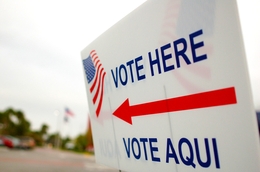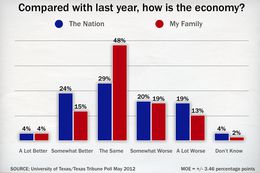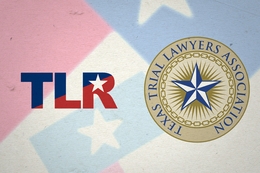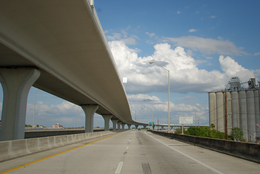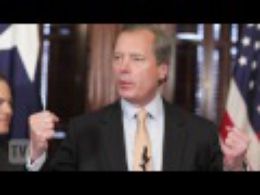We asked the insiders some of the same questions we asked likely voters in the latest University of Texas/Texas Tribune poll and, like the voters, they think the economy is the biggest problem facing the country. But where voters clustered a list of issues at the top of their state concerns, education and water were clearly ahead of everything else on the insiders' list.
On the national list, the insiders started with the economy, then followed with federal spending/national debt, partisan gridlock, and unemployment/jobs. With the exception of gridlock, that's the same list voters turned in.
At the state level, 30 percent of the insiders put education on top — dwarfing everything else — followed by water supply, political corruption/leadership, state budget cuts, and the economy. For voters, six issues were at the top, and in a virtual tie: immigration, the economy, unemployment/jobs, border security, education and political leadership.
The insiders think both the country (61 percent) and the state (53 percent) are going in the wrong direction. And a majority (51 percent) said the national economy is "a lot worse off" than it was a year ago. Only 6 percent said it was better. Their own personal and family economics, according to 52 percent, were about the same as a year ago; 38 percent said their personal outlook is better than it was last May.
The full set of comments from the insiders is attached. Some excerpts follow:

.
What would you say is the most important problem facing this country today?
• "The U.S. became great through rugged individualism. We are losing that competitive advantage due to growth of government, social spending, smothering European-style "taking care" of everyone."
• "Can't solve any problems unless you have an environment in which you can solve problems."
• "It's always about the economy, stupid!"
• "Until we fix the "legal corruption" then we can't fix any of these other problems. Money and self interests control the entire process"
• "Should have Water on this list"
• "Do away with the gridlock then all the other problems can be resolved"
• "Rome's moral fiber fell apart and as the say goes, the rest is history"
• "The hollowing out of the American middle class is the single most important issue facing the body politic today. Global corporate and governmental forces have combined to bring this about. There will be a reckoning."
• "Horrible leadership with a divided citizenry"
• "The economy is the key. A growing economy fixes income inequality, unemployment, taxes, social welfare, federal spending... you name it."

.
What would you say is the most important problem facing the state of Texas today?
• "Texas has become a semi-corrupt one-party state. Until we get some forward-thinking leadership, we are digging a huge hole for future generations."
• "Education is the problem and the answer. As long as it doesn't work, it is the core of the long-term problem. Once it is addressed, the rest of the world begins to fall into place."
• "Water wars will make everything else pale by comparison."
• "The public education issue is a ticking time bomb that threatens Texas' future well-being. With at least 40% of Texas kids not completing high school, we risk creating a giant underclass that will be reliant on public services."
• "We are in a water crisis we have not been willing to recognize yet. The economic consequences of running short on water will be huge if it happens."
• "Transportation, education and water are right up there where again we need strong leadership willing to attack problems with creative solutions rather than political sound bites."
• "Water and education are the most important long-term issues. We won't have a state without water and educated workers. Transportation is an essential short-term issue for the economy."
• "A growing state needs to be able to spend money on infrastructure"
• "The economy is the key issue. Without a vibrant economy, we can't tackle issues like water or transportation, which will both start to strangle the state at some point."

.
Thinking about the country, do you think that things are headed in the right direction, or do you think that things are headed off on the wrong track?
• "Economically, we're on the same path as Greece, Spain, France, Italy, et al. and it's not in the right direction. Something's gotta give in our country: entitlement and spending reform or massive tax increases, laid against the backdrop of a stagnant economy with historic unemployment numbers."
• "I am not sure we are on any track."
• "The economy is growing fitfully, but it is growing. Europe would give anything to be in our shoes."
• "I didn't realize the country was moving in any direction. We seem to be at a dead stop."
• "Federal leadership is a joke."
• "Recovery is too slow but the direction is right."
• "We are slowly extracting ourselves from foreign misadventures and man-made economic catastrophes. However, an obstructionist and bought Congress is retarding progress."
Thinking about the state of Texas, do you think that things are headed in the right direction, or do you think that things are headed off on the wrong track?
• "Generally we're holding to our small government philosophy, but the danger is in overdoing it, failing to plan for future growth in water, roads, etc."
• "We've weathered the storm fairly well, but like Germany being hit up to pay for the spending sins of Greece (and soon France), Texas will soon be hit up to pay for the spending sins of California."
• "Right track fiscally, wrong direction socially. Legislators are way too occupied with legislating morality."
• "We are still dealing with the same big issues as 15 years ago. Why? Bad leadership and bad decisions."
• "State lawmakers think borrowing money is ok and the way to prosperity.... pay-as-you-go government died with the Perry administration. No water, highway, education, or health solutions."
• "Is treading water a direction?"
• "Compare the state's infrastructure in 2012 to 2002. Education system, Transportation system, water resources, most uninsured in the nation - all declining."

.
Compared to a year ago, would you say that the national economy is a lot better off, somewhat better off, about the same, somewhat worse off, or a lot worse off?
• "Actual economic and job growth is anemic, and we've run up additional unbelievable that will have serious consequences down the road. Texas, especially Austin, is doing relatively well."
• "We have come back from the brink of disaster."
• "Continued prolonged stagnation, except in energy producing states, coupled with masking of the true number of unemployed while borrowing of 41 cents of every dollar spent is a downward trend no matter how much lipstick you put on the pig!"
• "The world economy is in the crapper and we are headed there - nothing we can do about it...we will have the same demonstrations on austerity programs that they are having in Europe..."
Compared to a year ago, would you say that you and your family are economically a lot better off, somewhat better off, about the same, somewhat worse off, or a lot worse off?
• "Fewer dollars for discretionary spending means I'm somewhat worse off. Still, I realize I'm in decent shape and have no room to complain. I wish others would cowboy up, too."
• "Two kids out of grad school . . . I got a raise!"
• "ObamaCare is killing the medical professionals. The brightest and best will no longer sacrifice if there is little or no economic reward."
• "But we're in the top 10%, so naturally we are doing better than most."
Our thanks to this week's participants: Homero Lucero, Ruben Longoria, Leslie Lemon, Mark Lehman, Luke Legate, Donald Lee, Dick Lavine, Pete Laney, Sandy Kress, Ramey Ko, Tom Kleinworth, Richard Khouri, Robert Kepple, Walt Jordan, Mark Jones, Cal Jillson, Richie Jackson, Deborah Ingersoll, Shanna Igo, Laura Huffman, Billy Howe, Steve Holzheauser, Ken Hodges, Adam Haynes, Albert Hawkins, Bill Hammond, Wayne Hamilton, Jack Gullahorn, John Greytok, Daniel Gonzalez, Kinnan Golemon, Bruce Gibson, Dominic Giarratani, Norman Garza, Wil Galloway, Terry Frakes, Tom Forbes, Jon Fisher, John Esparza, Alan Erwin, Gay Erwin, Jack Erskine, Jeff Eller, Richard Dyer, David Dunn, Nora Del Bosque, June Deadrick, Hector De Leon, Denise Davis, Randy Cubriel, George Cofer, Elna Christopher, Elizabeth Christian, William Chapman, Corbin Casteel, Tris Castaneda, Snapper Carr, Thure Cannon, Marc Campos, Kerry Cammack, Lydia Camarillo, Chris Britton, Steve Bresnen, Hugh Brady, Tom Blanton, Allen Blakemore, Andrew Biar, Amy Beneski, Dave Beckwith, Walt Baum, Tom Banning, Charles Bailey, Doc Arnold, Jay Arnold, George Allen, Clyde Alexander, Brandon Aghamalian, Jenny Aghamalian, Cathie Adams, Gene Acuna, Angelo Zottarelli, Peck Young, Alex Winslow, Seth Winick, Michael Wilt, Ellen Williams, Darren Whitehurst, Ken Whalen, Ware Wendell, John Weaver, Trey Trainor, Trent Townsend, Gerard Torres, Russ Tidwell, Jay Thompson, Sherry Sylvester, Charles Stuart, Colin Strother, Bob Strauser, Keith Strama, Bill Stevens, Jason Stanford, Dennis Speight, Larry Soward, Todd Smith, Martha Smiley, Ed Small, Jason Skaggs, Bradford Shields, Julie Shields, Steve Scurlock, Bruce Scott, Stan Schlueter, Jim Sartwelle, Andy Sansom, Mark Sanders, Jason Sabo, Kim Ross, Chuck Rice, Tim Reeves, Karen Reagan, Bill Ratliff, Ted Melina Raab, Jay Propes, Kraege Polan, Royce Poinsett, Wayne Pierce, Tom Phillips, Jerry Philips, Bill Pewitt, Gardner Pate, Nef Partida, Lee Parsley, Pat Nugent, Sylvia Nugent, Keats Norfleet, Keir Murray, Craig Murphy, Steve Murdock, Bee Moorhead, Robert Miller, Mike McKinney, Bryan Mayes, Luke Marchant, Matt Mackowiak.
